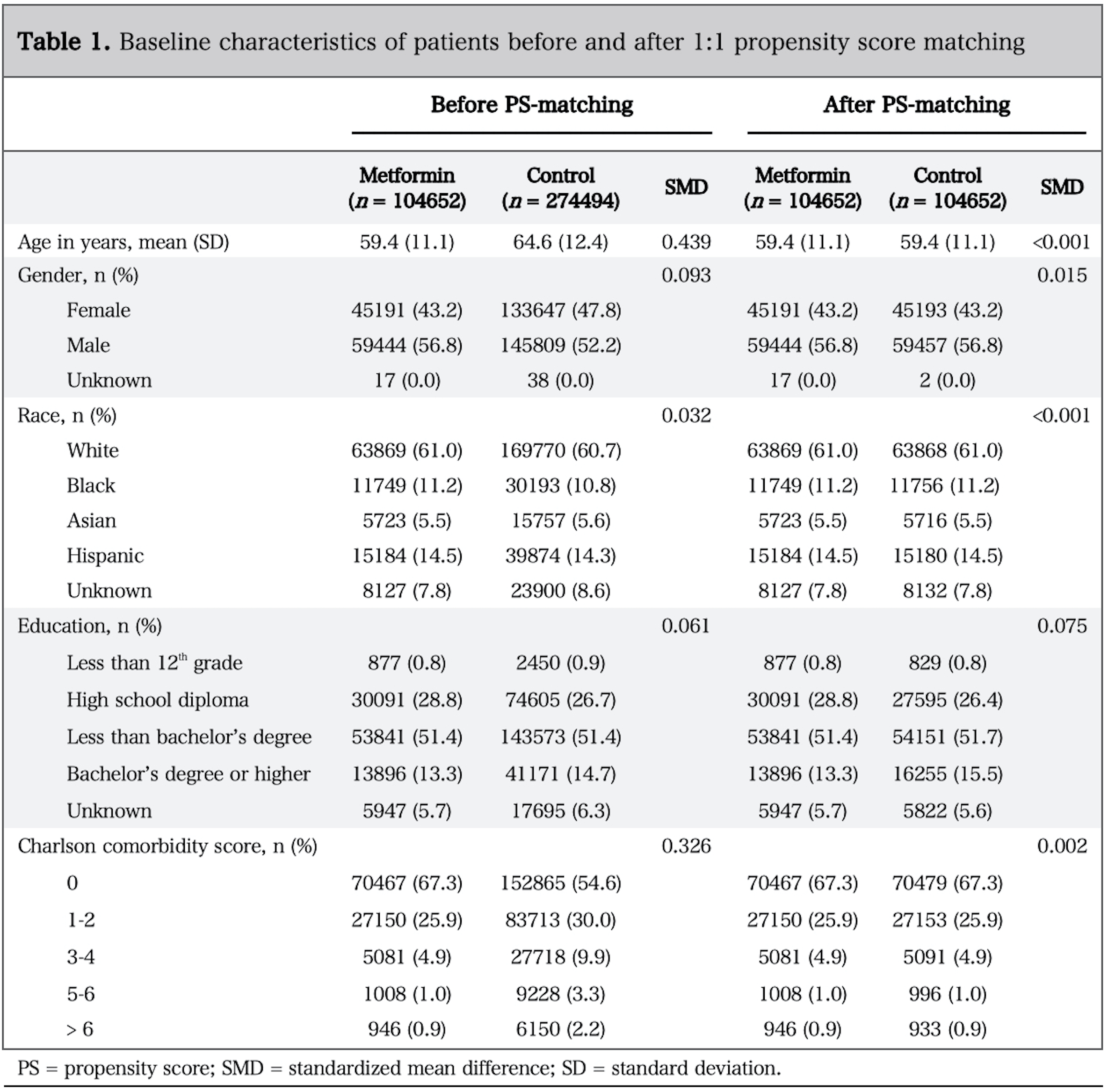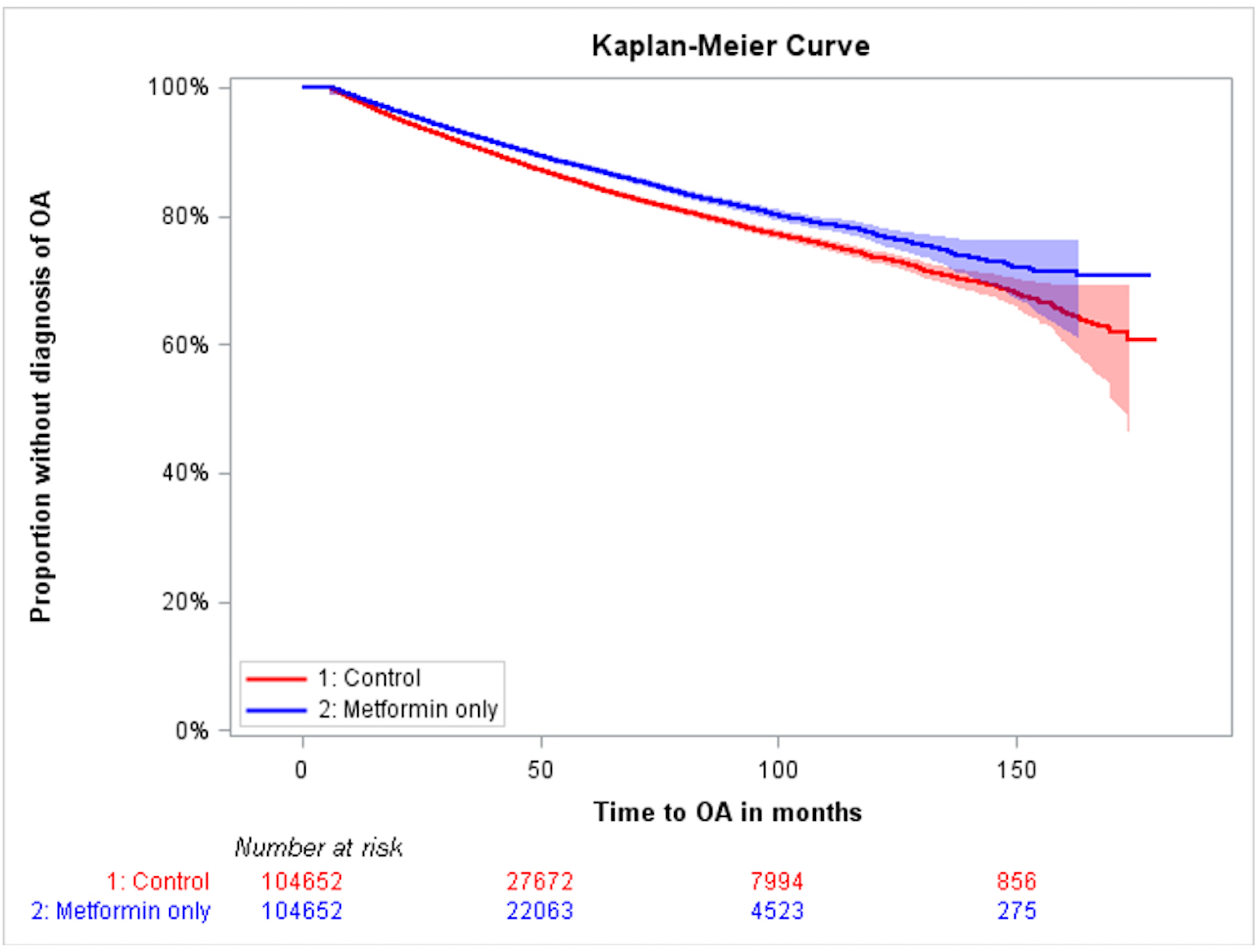Session Information
Session Type: Abstract Session
Session Time: 3:00PM-3:15PM
Background/Purpose: Preclinical and observational data suggest a protective effect of metformin against developing osteoarthritis (OA).1,2 In this retrospective cohort study, we evaluated the time to developing osteoarthritis and time to joint replacement in patients with diabetes mellitus (DM) treated with metformin compared to patients with DM who did not receive metformin or any other DM treatment.
Methods: This was a retrospective cohort study using claims data from the Optum Clinformatics™ Data Mart between 2003 and 2019. We identified patients aged 40 years or older with more than two years of continuous enrollment and at least two ICD-9 or ICD-10 codes for DM separated by 14 days or more. Patients were excluded if they had type I DM, if they received any DM medication other than metformin, or if they had a prior diagnosis of OA, inflammatory arthritis, or joint replacement. The exposed group included patients treated with metformin, and the control group included patients with DM who were not treated with any medications for DM. We conducted 1:1 propensity score matching and used Cox proportional hazard models to calculate the adjusted hazard ratio (HR) of 1.) developing OA and 2.) undergoing hip or knee joint replacement. Kaplan-Meier curves were created to report the time to diagnosis of OA.
Results: A total of 384,146 patients met study inclusion and exclusion criteria, of which 104,652 were treated with metformin and 274,494 were not. After propensity score matching, both groups had a mean age of 59.4 years and were 43.2% female (Table 1). In a multivariable analysis, after adjusting for age, gender, race/ethnicity, and Charlson comorbidity score, the risk of developing OA was reduced by 21% for patients who had been treated with metformin compared to those who had not (adjusted HR 0.79; 95% confidence interval (CI) 0.77-81; p< 0.001), and the adjusted HR for time to joint replacement was 0.90 (95% CI, 0.83-0.98; p=0.01). After propensity score matching, the adjusted HR for developing OA was 0.77 (95% CI, 0.74-0.81; p< .001) and the adjusted HR for time to joint replacement was 0.86 (95% CI, 0.75-0.99; p=0.038) (Table 2). Survival analysis demonstrates separation of the Kaplan-Meier curves by 24 months after treatment initiation (Figure).
Conclusion: This study demonstrates a significant reduction in the risk of developing OA and in the need for joint replacement in DM patients treated with metformin compared to DM patients who did not receive metformin. Results from this study further support the preclinical and observational data that metformin may have a protective effect against the development of OA. Future interventional studies with metformin for the treatment or prevention of OA could be considered.
References:
1. Wang Y, Hussain SM, Wluka AE, et al., Arthritis Res Ther 21, 127 (2019).
2. Li J, Zhang B, Liu WX, et al., Ann Rheum Dis 79, 635-645 (2020).
To cite this abstract in AMA style:
Sheth K, Lu D, Lu R, Robinson W, Baker M. Metformin Use Reduces the Risk of Developing Osteoarthritis: A Propensity Score Matching Study [abstract]. Arthritis Rheumatol. 2021; 73 (suppl 9). https://acrabstracts.org/abstract/metformin-use-reduces-the-risk-of-developing-osteoarthritis-a-propensity-score-matching-study/. Accessed .« Back to ACR Convergence 2021
ACR Meeting Abstracts - https://acrabstracts.org/abstract/metformin-use-reduces-the-risk-of-developing-osteoarthritis-a-propensity-score-matching-study/



